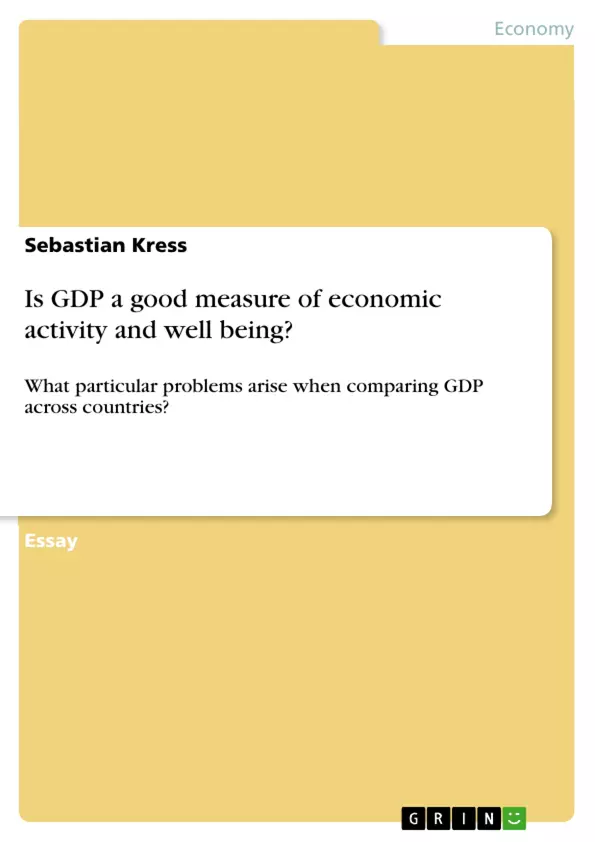The business world offers numerous examples of corporations benefiting from competition, as they have to increase their productivity, economise their cost, and need to strive for innovations. It is generally agreed, that from a microeconomics’ view firms seek to win this competition, which can be determined by parameters such as revenue, profit, or customer satisfaction. Ancillary, competition does not only prevail between companies on a microeconomics level but also among country’s economies on a macroeconomic level. This competition received a lot of attention in recent years, which is also biased by the shift towards a more integrated and interdependent world economy that can be referred to as the term globalisation (Hill, 2011, p.24). However, it needs to be questioned, how to contrast the performance of one economy with the performance of another. How can we assess national income or output? The measure that is widely accepted and used is called gross domestic product (GDP) (Sloman and Wride, 2009, p.393). The purpose of this paper is to briefly outline what exactly incorporates in GDP and mainly to examine whether GDP is a good measure of economic activity and well being.
Inhaltsverzeichnis (Table of Contents)
- INTRODUCTION
- THE NOTION OF GROSS DOMESTIC PRODUCT
- ISSUES WITH CROSS DOMESTIC PRODUCT
- GROSS DOMESTIC PRODUCT AS A MEASURE OF WELL BEING
- CONCLUSION
Zielsetzung und Themenschwerpunkte (Objectives and Key Themes)
This paper aims to explore the notion of Gross Domestic Product (GDP) and assess its effectiveness as a measure of economic activity and well-being. It examines the components of GDP, discusses its limitations, and explores alternative indicators that may provide a more holistic view of societal progress.- The concept and calculation of GDP
- Issues with using GDP as a measure of national output and well-being
- Alternative measures to GDP, such as subjective measures of life satisfaction
- The significance of incorporating social and economic factors in measuring well-being
- The limitations of GDP and the search for alternative indicators
Zusammenfassung der Kapitel (Chapter Summaries)
- Introduction: This chapter introduces the concept of GDP as a measure of national output and competition, emphasizing its importance in a globalized world. It highlights the need to examine whether GDP effectively reflects economic performance and well-being.
- The Notion of Gross Domestic Product: This chapter delves into the concept of GDP, defining it as a measure of market output, and outlining the three methods used to calculate it. It also differentiates between nominal and real GDP, emphasizing the importance of accounting for inflation.
- Issues with Gross Domestic Product: This chapter addresses the limitations of using GDP for comparing national economies, highlighting the complexities of currency conversion and the potential for understating GDP due to unrecorded goods and services. It also explores the concept of purchasing-power parity (PPP) and its role in adjusting for differences in local purchasing power.
- Gross Domestic Product as a Measure of Well Being: This chapter examines the growing criticism of GDP as a sole measure of well-being, arguing that it excludes important factors such as happiness and social progress. It explores alternative indicators, such as subjective measures of life satisfaction, and emphasizes the need for a more comprehensive approach to measuring societal well-being.
Schlüsselwörter (Keywords)
This paper examines key economic concepts related to the measurement of national output and well-being, focusing on Gross Domestic Product (GDP), its limitations, and alternative indicators. It also explores themes such as economic growth, inflation, purchasing-power parity (PPP), subjective measures of life satisfaction, and the importance of incorporating social and economic factors in assessing societal progress.Frequently Asked Questions
What does GDP actually measure?
Gross Domestic Product (GDP) measures the total market value of all final goods and services produced within a country in a given period.
Why is GDP criticized as a measure of well-being?
GDP excludes non-market activities (like housework), ignores income inequality, and does not account for environmental degradation or personal happiness.
What is the difference between nominal and real GDP?
Nominal GDP is calculated using current prices, while real GDP is adjusted for inflation to reflect the actual volume of production.
How does Purchasing-Power Parity (PPP) help in comparing economies?
PPP adjusts for differences in price levels between countries, allowing for a more accurate comparison of the actual standard of living and purchasing power.
What are alternative indicators to GDP?
Alternatives include subjective measures of life satisfaction, the Human Development Index (HDI), and indicators that incorporate social and environmental factors.
- Arbeit zitieren
- Sebastian Kress (Autor:in), 2012, Is GDP a good measure of economic activity and well being? , München, GRIN Verlag, https://www.grin.com/document/192532



